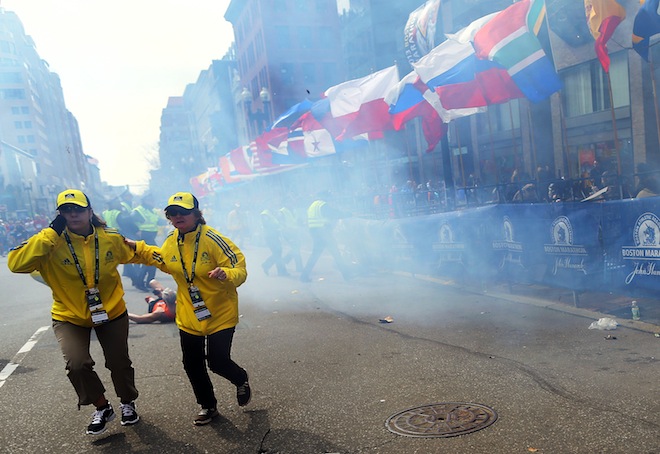Boston attacks rife with tragedy and cruel irony
Tease the day: The world reacts to twin bombs at marathon
People react to an explosion at the 2013 Boston Marathon in Boston, Monday, April 15, 2013. Two explosions shattered the euphoria of the Boston Marathon finish line on Monday, sending authorities out on the course to carry off the injured while the stragglers were rerouted away from the smoking site of the blasts. (AP Photo/The Boston Globe, John Tlumacki)
Share

Lots of us in this part of the world, if we hear an explosion, don’t immediately think it’s an explosion. We live relatively peaceful lives in relatively peaceful cities, where things that sound like explosions are almost always other things. Eyewitness reports from Boston yesterday, where twin blasts near the finish line of the city’s annual marathon killed at least three and injured dozens of others, quote runners and their families as assuming the explosions were “fireworks,” or a “gunshot,” or a “race cannon,” or even “bleachers collapsing.” It’s not in our nature to assume otherwise. But everyone learned quickly just how destructive these bombs really were.
The gruesome irony of the scene is paralyzing. Spectators watching a marathon, the ultimate demonstrate awesome power and endurance, illustrated by the rhythmic pounding of pavement, lost their legs. Family and friends losing limbs as their loved ones’ athletic careers reach a crescendo. All that on Patriots Day, of all days, in the city that sparked a revolution.
Canadian newspapers devote the full weight of their reporting prowess to the carnage in Boston: story after story about what happened, who was hurt, where the Canadians are, what eyewitnesses saw, how these things should be reported, and why runners will want to run in Boston next year more than ever. And that’s just Canada: the whole world has embraced Boston this morning.
What’s above the fold this morning?
The Globe and Mail leads with twin bombings during the Boston Marathon. The National Post also fronts the Boston attacks. The Toronto Star also goes above the fold with the Boston attacks. The Ottawa Citizen also leads with the Boston attacks. iPolitics fronts a poll that suggests Ontarians don’t want to go to the polls. CBC.ca leads with the FBI’s hunt for suspects in the Boston attacks. National Newswatch showcases a Canadian Press report that two Conservative backbenchers—Michael Chong and Pierre Lemieux, both from rural Ontario—are standing up for B.C. MP Mark Warawa’s freedom of speech.
Stories that will be (mostly) missed
| 1. Procurement. In the wake of a failed bidding process to equip soldiers, Public Works is rejigging procurement rules to allow firms to make minor changes to bids after they’re submitted. | 2. Diplomats. Canada’s foreign services officers may not show up to work in the suits they normally wear. As part of ongoing labour action, the diplomats will dress “creatively” in the office. |
| 3. Terrorism. Mahad Ali Dhore, a Canadian, died in a courthouse in Somalia over the weekend during a terrorist attack. Authorities are unclear if he was among the attackers or facing trial at the time. | 4. Drug safety. The Conservatives will improve tracking of side effects to prescription drugs, according to a Star report that Health Minister Leona Aglukkaq will announce new plans today. |
More on the Boston Marathon bombings: